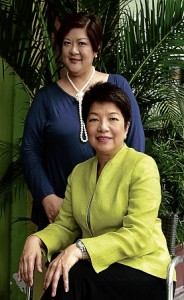Echostore combines good cause with commerce
It started out as an ideal: marrying mission and money in enterprise. Likewise, the founders jested that they wanted a business that would sustain them as they age gracefully. It would have to be a low-profit, low limited liability company.
Four years ago artist Jeannie Javelosa, marketing specialist Pacita “Chit” Juan and operations whiz Regina “Reena” Francisco wanted a venture that served the triple bottom line: people, planet and profits.
Echostore was conceived as a specialty store that promoted sustainable lifestyle. It earned its reputation sourcing and marketing eco-friendly products from all over the country, produced by communities or groups for their livelihood. Echostore is the acronym for Environment & Community Hope Organization Store.
Since its inception, it has won the prestigious World Business and Development Awards together with Rags2Riches for social entrepreneurship. Echostore is also one of the three representatives from the Asia-Pacific that is nominated for the Cartier’s Women’s Initiative Awards in Paris this October.
“It’s about doing business with a heart,” said Juan, Echostore’s president.
“Beyond making money, we are helping communities and small entrepreneurs. We’re giving others, who don’t have opportunities, to earn money,” added Francisco, Echostore’s operations manager.
Local deli
The core of Echostore’s business is promoting livelihood.
Juan recalled how Echostore initially reached out to projects under the Philippine Business for Social Progress.
Although PBSP trained poor communities on values formation, capacity building and skill training, the beneficiaries didn’t know how and where to sell their products.
“We would ask the community if the product would suit our store. If not we would package it for them or they would have to change,” said Juan.
The initial offerings were organic local delicatessen products, teas and bags from recycled materials.

PACITA Juan (seated), Reena Francisco and third partner Jeannie Javelosa wanted a business that looked after people, planet and profit.
Echostore in Serendra served as an incubator for the market to respond to their product. Some managed to get into the mainstream: Crafters Joy in Pangasinan makes use of discarded cornhusk for accessories. Invisible Sisters, headed by artist Ann Wizer, crochets old Betamax and U-matic tapes and grocery plastics into patterned bags. Recycled Zest-O packs, made by the Maraming Bayani Foundation, have become a classic in the upcycling category. These were made by hand in Gawad Kalinga communities where sewing machines were not available.
On nurturing the planet, Echostore’s spin-off is its green grocer that sells produce from the Echofarms in Amadeo, Cavite and from farmers who cultivate organic vegetables.
“I grow what I like to eat—arugula, lolo rossa, romaine, eggplant, bitter gourd and the other vegetables that go with pinakbet,” said Juan.
Deli items—jellies, jams and tamarind paste, taro and tuber chips from Ilocos, native chocolate, artisinal cheeses from Jalajala, Rizal—make up 40 percent of the sales.
Lifestyle changes
Aside from uniqueness and freshness, Echostore’s appeal lies the narrative behind each product. “Part of what you’re paying for is the story. But we don’t want pity. That’s not sustainable. You buy it because it’s good,” maintained Juan.
All the products have tags that reveal their provenance: abaca macramé bags by the Aetas of Pampanga, capiz-encrusted purses by Bicolanas and water lily bags by the Villar Foundation, and coffee and sun-dried tomatoes by Kababaihang Masigla ng Nueva Ecija. Proceeds of the beaded bags made by a women’s correctional institute pay for the medicine of the inmates.
On its profitability, Juan explained that the flagship store in Serendra expanded to 100 sqm to include the produce section. Further, Echostore opened a 10-sqm space in Podium. Sales have been growing by 20 to 30 percent annually. The founders attribute the eco trend.
The customers tend to be affluent and more attuned to environmental causes, some 80 percent are women.
Part of Echostore’s credibility lies in the lifestyles of the owners. Javelosa is a Yoga instructor. Juan and Francisco took up Buteyko breathing and have been eating organic foods.
“You can’t promote a sustainable lifestyle if you’re smoking and drinking,” said Juan. “We had to make lifestyle changes. You must also like what you sell.”
Advocacy
Aside from the Serendra venue, Echostore had distribution outlets in high-end places such as the souvenir shops in the Shangri-La hotels and Marriott Cebu and Naia Terminal 3. “That was our model. No rent charge. They got a percentage of the sales,” said Juan. “It was good exposure.”
As word got around, Echostore attracted benefactors who believe in their cause. Hence ECHOsi headed by Javelosa provided the venue. (Enabling Communities with Hope and Opportunities through Sustainable Initiatives) was organized to help these communities to package and to market their products.
Volunteers such as designer Tes Pasola, Vicky Lim Ortega and Ramby Lim would fly around the country to remote areas. They would educate the communities on how to package their products. It has also attracted organizations such as the Canadian International Development Authority and New Zealand embassy.
People have been providing the founders airfare and accommodations to the provinces where the Echostore proponents can teach. “We’re like the modern missionaries. Our gospel is empowerment through livelihood,” declared Juan.
“Our real work is helping communities. Echostore is the showcase of what we’ve been doing,” said Francisco.

